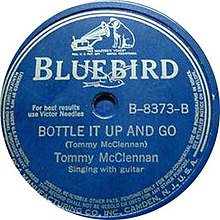Bottle Up and Go
| "Bottle It Up and Go" | ||||
|---|---|---|---|---|
 |
||||
| Single by Tommy McClennan | ||||
| B-side | "Whiskey Headed Woman" | |||
| Released | 1939 | |||
| Format | 10-inch 78 rpm record | |||
| Recorded | RCA Studio A, Chicago, November 22, 1939 | |||
| Genre | Blues | |||
| Length | 2:46 | |||
| Label | Bluebird (no. 8373) | |||
| Tommy McClennan singles chronology | ||||
|
||||
"Bottle Up and Go" or "Bottle It Up and Go" is a song that is a standard of the blues. Based on earlier songs, Delta bluesman Tommy McClennan recorded "Bottle It Up and Go" in 1939. The song has been interpreted and recorded by numerous artists, sometimes using alternate titles, such as "Step It Up and Go", "Shake It Up and Go", etc. John Lee Hooker performed it throughout his career and recorded several versions of the song.
In 1932, a jug band version of "Bottle It Up and Go" was recorded by a loose musical collective led by Will Shade and Charlie Burse, who recorded as the Memphis Jug Band, Picaninny Jug Band, Dixieland Jug Blowers, Dallas Jug Band, and other names. Based on a "traditional piece known in the South", it features several verses in the hokum blues style with jug band accompaniment. A second version was recorded and released by the Memphis Jug Band in 1934 (Okeh 8959).
In 1937, John Lee "Sonny Boy" Williamson recorded the song as "Got the Bottle Up and Go" (or "Got Bottle Up & Gone") (Bluebird 7012). It was performed as an early Chicago blues with Williamson on vocal and harmonica accompanied by Big Joe Williams and Robert Lee McCoy (later known as Robert Nighthawk) on guitars. These early versions of "Bottle Up and Go" include the refrain "High-powered mama, daddy's (or papa's) got your water on".
In 1939, Tommy McClennan recorded "Bottle It Up and Go" during his first recording session for Bluebird Records. His song includes "a catchy guitar lick, a stomping danceable groove and a neat structure which divided the twelve-bar [blues] stanza into verse and chorus: socking home a different coupler each time". It is a solo piece with McClennan on vocal and guitar and borrows lyrics from earlier songs. McClennan used verses similar to those found in "Hesitation Blues": "Now nickel is a nickel, a dime is a dime..." and "The Duck's Yas-Yas-Yas": "Now my mama killed a chicken, she thought it was a duck, she put 'im on the table with 'is legs sticking up". He also used verses similar to those in Julius Daniels' 1927 song "Can't Put the Bridle On That Mule This Morning" (Victor 21359-A): "Now the nigger and the white man playin' seven-up, nigger beat the white man [but he's] scared to pick it [the winnings] up". These verses have been traced back to 19th-century work songs, which were noted in an 1870s newspaper article.
...
Wikipedia
